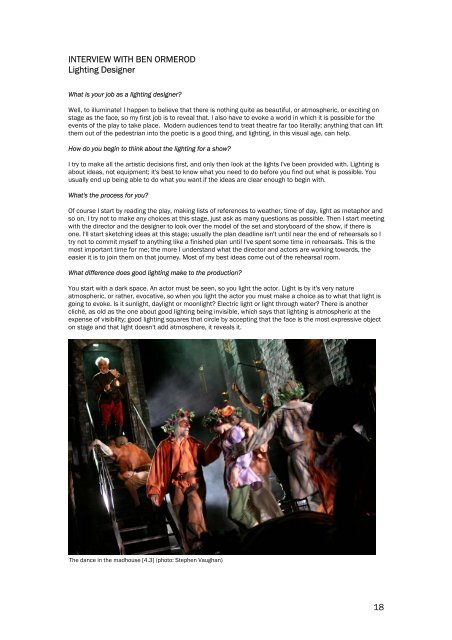Download The Changeling Education Pack - English Touring Theatre
Download The Changeling Education Pack - English Touring Theatre
Download The Changeling Education Pack - English Touring Theatre
You also want an ePaper? Increase the reach of your titles
YUMPU automatically turns print PDFs into web optimized ePapers that Google loves.
INTERVIEW WITH BEN ORMEROD<br />
Lighting Designer<br />
What is your job as a lighting designer?<br />
Well, to illuminate! I happen to believe that there is nothing quite as beautiful, or atmospheric, or exciting on<br />
stage as the face, so my first job is to reveal that. I also have to evoke a world in which it is possible for the<br />
events of the play to take place. Modern audiences tend to treat theatre far too literally; anything that can lift<br />
them out of the pedestrian into the poetic is a good thing, and lighting, in this visual age, can help.<br />
How do you begin to think about the lighting for a show?<br />
I try to make all the artistic decisions first, and only then look at the lights I've been provided with. Lighting is<br />
about ideas, not equipment; it's best to know what you need to do before you find out what is possible. You<br />
usually end up being able to do what you want if the ideas are clear enough to begin with.<br />
What's the process for you?<br />
Of course I start by reading the play, making lists of references to weather, time of day, light as metaphor and<br />
so on. I try not to make any choices at this stage, just ask as many questions as possible. <strong>The</strong>n I start meeting<br />
with the director and the designer to look over the model of the set and storyboard of the show, if there is<br />
one. I'll start sketching ideas at this stage; usually the plan deadline isn't until near the end of rehearsals so I<br />
try not to commit myself to anything like a finished plan until I've spent some time in rehearsals. This is the<br />
most important time for me; the more I understand what the director and actors are working towards, the<br />
easier it is to join them on that journey. Most of my best ideas come out of the rehearsal room.<br />
What difference does good lighting make to the production?<br />
You start with a dark space. An actor must be seen, so you light the actor. Light is by it's very nature<br />
atmospheric, or rather, evocative, so when you light the actor you must make a choice as to what that light is<br />
going to evoke. Is it sunlight, daylight or moonlight? Electric light or light through water? <strong>The</strong>re is another<br />
cliché, as old as the one about good lighting being invisible, which says that lighting is atmospheric at the<br />
expense of visibility; good lighting squares that circle by accepting that the face is the most expressive object<br />
on stage and that light doesn't add atmosphere, it reveals it.<br />
<strong>The</strong> dance in the madhouse [4.3] (photo: Stephen Vaughan)<br />
18





